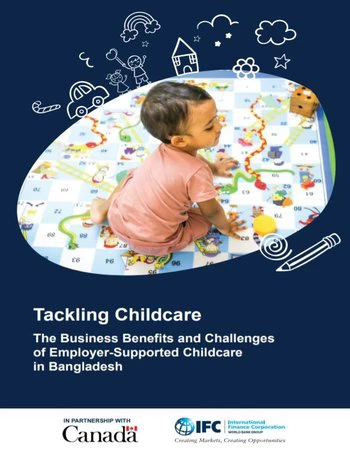Bangladesh has a persistent and large gender gap in employment. In 2017, the male labor force participation rate was 80% while the female labor force participation (FLFP) rate stood at 36% (World Bank, 2019)). In fact, there has been a decline in urban female labor force participation rates since 2014. Even traditionally women-dominated sectors in Bangladesh such as ready-made garments have also seen a decline in women’s employment (ILO, 2018).
Factors such as social norms governing women’s work and travel outside the domestic sphere as well as women’s unpaid care and household work are often cited as reasons for Bangladesh’s declining FLFP. The Dhaka low Income area Gender, Inclusion, and poverty (or DIGNITY) survey analyzes data from 1,300 urban households in low-income areas of Dhaka City and shows that on average, women spend 5.16 hours per day on childcare and domestic work whereas men spend 0.34 hours per day on the same activities.
Enabling access to reliable, affordable, and good-quality childcare can in turn enable women’s access to more and better jobs while improving children’s development outcomes as well as business and economic growth in Bangladesh.
Recognizing the challenges associated with the lack of good quality, affordable childcare, and the benefits that accrue over time if access is enabled, the Government of Bangladesh has instituted a set of policies to enhance family-friendly work environments. The Bangladesh Labour Act requires businesses with more than 40 female employees to offer childcare options to their employees’ children who are under the age of 6.
The policy brief presents findings from an IFC-led survey administered to more than 300 employers as well as consultations with more than 75 employees and 40 stakeholders in Bangladesh, including the government, civil society, and care providers, on the benefits, challenges, and solutions for employer-supported childcare in Bangladesh. In light of this research, the brief presents recommendations for employers, the government, and the development sector to advance employer-supported childcare in line with the legal mandate while improving outcomes for parents, children, businesses, and the economy of Bangladesh.
This policy brief builds on IFC’s series of Tackling Childcare Reports and is the result of a collaboration with several Bangladesh-based partners, including LightCastle Partners, the Ministry of Women and Children’s Affairs’ Bangladesh Shishu Academy, as well as BACCO, Better Work Bangladesh, BGMEA, BHTPA, BLFCA, BRAC-IED, BUILD, DCCI, Phulki, UNICEF Bangladesh, UN Global Compact Bangladesh, and the World Bank. Many thanks to all our partners for their commitment and engagement.
Visit here for more information on the research methodology.
